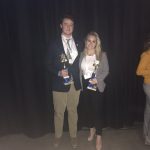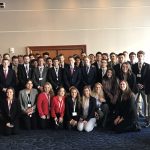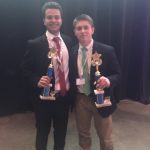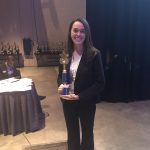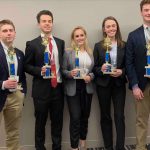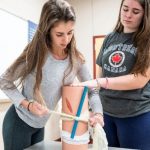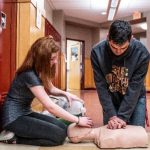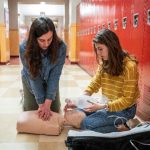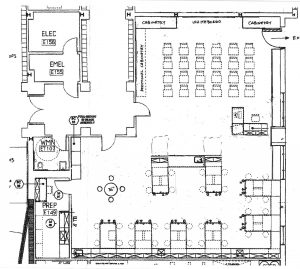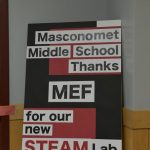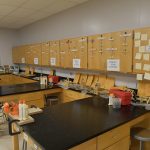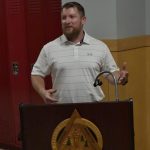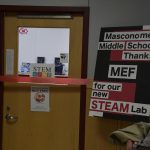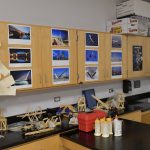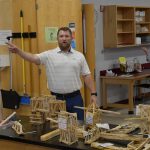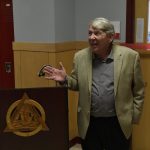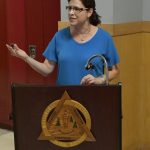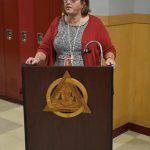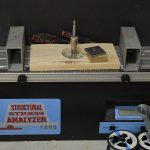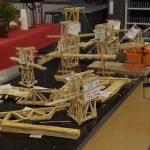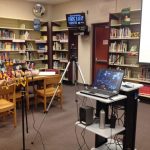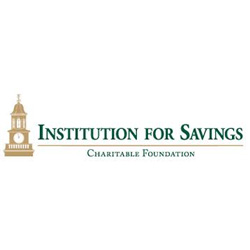Psychology Field Trip to Harvard:
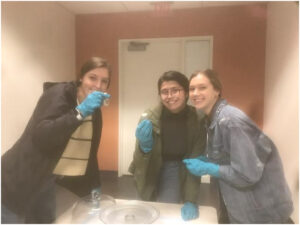
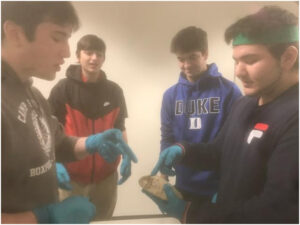 The group from Masco was able to meet Dr Leah Somerville and her Cognitive Neuroscience Lab Staff. While there, they learned about how an MRI works as well as listened to a lecture on adolescent brainsSpanish Exchange Trip.
The group from Masco was able to meet Dr Leah Somerville and her Cognitive Neuroscience Lab Staff. While there, they learned about how an MRI works as well as listened to a lecture on adolescent brainsSpanish Exchange Trip.
Spanish Exchange:
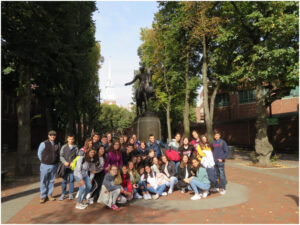 The Group of Masconomet and Spanish Exchange Students went into Boston so that there was a shared teaching and learning experience about our home state’s capital city.
The Group of Masconomet and Spanish Exchange Students went into Boston so that there was a shared teaching and learning experience about our home state’s capital city.
Hallway Furniture :
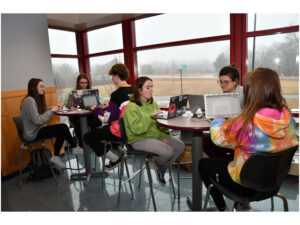 Allowing MEF to make inroads towards the Vision 2025 initiative -creating more engaging and personalized space for student collaboration.
Allowing MEF to make inroads towards the Vision 2025 initiative -creating more engaging and personalized space for student collaboration.
Pamela G Culver Global Diploma Travel Scholarship:
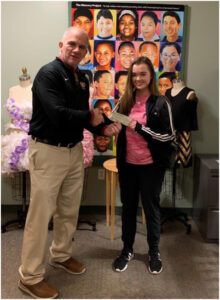
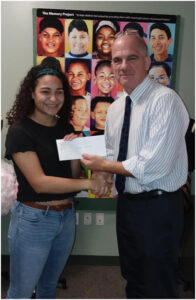
Awarded to Brooke Baptista and Lindsay Porter
AP Government field trip to State House: 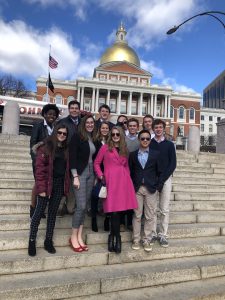
The best place to learn about government is where it happens: in the State House. MEF sent Mrs. Story’s AP Government students to the Massachusetts State House to meet their reps and learn how to advocate for issues important to them.
Biopsychology Students to Boston University :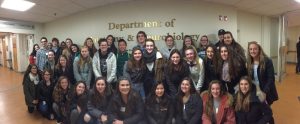
Oh, the things they will learn! Masconomet Educational Foundation funded a field trip for Masco psychology students to visit Boston University Medical School’s Neurobiology Lab. The students heard a college lecture and toured the facilities.
Mass State DECA Competition:
Masco’s DECA business-education program has grown in leaps and bounds
since it started three years ago. This year over 60 students qualified for the state conference, and Masconomet Education Foundation supported their trip to Boston. 13 students placed in the Top 10 in their categories, and 6 Masco student placed in the Top 5 in their categories, qualifying for the International DECA competition in April. Well done!
EMT Classes:
The CPR Mannikins and Stop the Bleed Kits that MEF purchased for Masco’s EMT classes are helping our kids learn to save lives.
French/AP Art Field Trip to MFA:
Fifth-year French students are assigned a research project on French artists and their works. What better way to study this artwork than to see them in person, and the Museum of Fine Arts. Masconomet Education Foundation funded this field trip for French students and AP Art students to travel to the MFA and study the French Masters.
Middle School Steam Lab:
Alas, the Middle School Steam Lab is complete and opened for student use this fall. The renovation work on the Middle School STEAM lab included:
- Eliminating a wall to combine two classrooms in order to allow for more space for lab projects while maintaining classroom learning area.
- Additional cabinetry for storage of projects and supplies
- The creation of a secure exit to courtyard for outdoor experiments
- New ceiling fans for ventilation
Google Expedition Virtual Reality Equipment
which allows students to visit foreign lands, fly to outer space, turn the classroom into a virtual museum, all without leaving the classroom.
Maker Space
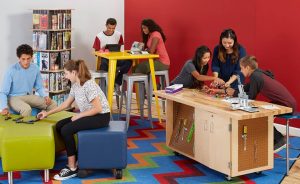 The new Maker Space in the Masco high school library, offering community building activities and creative competitions for all students. Innovation, creativity and thinking outside the box – aspects of learning that MEF loves to encourage. Many thanks to Ms. Sheehy for initiating this program!
The new Maker Space in the Masco high school library, offering community building activities and creative competitions for all students. Innovation, creativity and thinking outside the box – aspects of learning that MEF loves to encourage. Many thanks to Ms. Sheehy for initiating this program!
Auditorium Sound System Improvements
The upgrade to the sound system benefits the music and drama department. The addition of on-stage drop microphones better captures the performance on the stage.
First Aid & Medical Responder Equipment
The Masconomet Education foundation approved a request for a grant submitted by Greg West from the Wellness Department for Adult and infant CPR Manikins, an Airway Simulator and Stop the Bleed Kits. This training manikins offer realistic training and practice of adult and infant airway management and CPR education.
The Stop the Bleed kits which are designed to provide its user with immediate access to products intended to stop traumatic hemorrhaging. These kits are all vacuum packed and tamper-proofed for easy storage and opening. The kit will be available for student and faculty use.
DECA (Distributive Education Clubs of America) Nationals: Bryan Duplissie/Jennifer Richard, High School Business Teachers
Four students in Masconomet’s business program and Masco’s first year DECA chapter, performed at the highest levels in the district and state, qualifying them to compete at the DECA National competition April 25-30 in Anaheim, CA. These students will represent Masco, competing against 12,000+ other high school students demonstrating their college and career-ready knowledge and skills. They will meet with business professionals and major corporations in career workshops and the DECA’s Emerging Leader Series. This grant provides financial support for travel expenses.
Middle School Science/STEM Equipment: M.S. Science/STEM Teachers
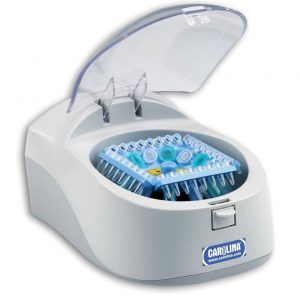
The Middle School’s Science and STEM classes were just provided with $13,000 in new equipment. Our kids will be learning science and technology with hands-on projects ranging from Cellular Respiration, to DNA Testing, to Wave Amplitude. Additional equipment includes a centrifuge, Bunsen burners, an incubator, three electric composters, sound tubes, prisms, crazy traits (gene modeling), digital scales, DNA K’NEX, Fruit Flies mutation kit, Glow in the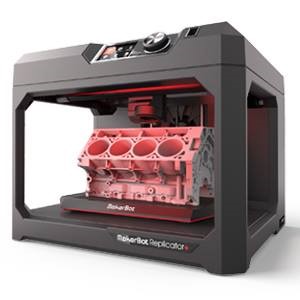 Dark Transformation kit, a barometer and water bath, and a series of kits to analyze friction, speed and force and construct molecular models. The students will be able to predict the weather, model Newton’s 3rd law of physics, refract light, and examine DNA. And the 8th Grade STEAM classes will receive their own 3D printer.
Dark Transformation kit, a barometer and water bath, and a series of kits to analyze friction, speed and force and construct molecular models. The students will be able to predict the weather, model Newton’s 3rd law of physics, refract light, and examine DNA. And the 8th Grade STEAM classes will receive their own 3D printer.
Pop Rocket Launch Systems: David Kurtz, High School Science Teacher
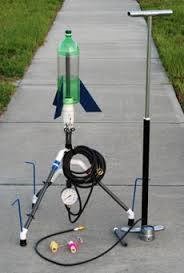 A grant for two electronic air compressors, and associated accessories, will be used by engineering students to launch prototype rockets to test robotic parachute deployment systems.
A grant for two electronic air compressors, and associated accessories, will be used by engineering students to launch prototype rockets to test robotic parachute deployment systems.
Student Day of Poetry: Shannon Murphy, High School English Teacher
Masco’s 3rd annual Student Day of Poetry for sophomores and juniors is a program coordinated by the MA State Poetry Festival to inspire enthusiasm for 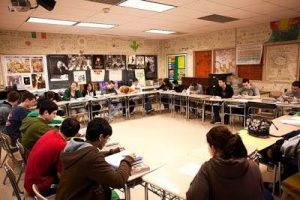 poetry as a living art in our schools. A group of ten published poets, many of whom are also educators, led students in writing workshops and an open mic reading of student poetry. Students also performed their own work.
poetry as a living art in our schools. A group of ten published poets, many of whom are also educators, led students in writing workshops and an open mic reading of student poetry. Students also performed their own work.
Internal Combustion Engine Project: Norman Clark, High School Science Teacher
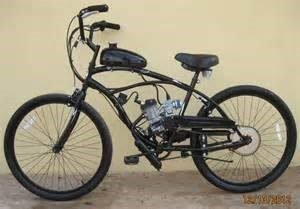 This grant, which provides funding for five 2 stroke motorized bicycle kits and four basic mechanics tool kits, will be used to teach students about the function and technologies behind the internal combustion engine (ICBE) in the pre-engineering/STEM curriculum. This class is devoted entirely to hands-on project based instruction. These small combustion engines would be used to convert bicycles into motorized bikes. Students would learn the principle operation of ICBE, how to use basic mechanics hand tools, and how to solve logistical problems involved with adapting equipment and hardware to meet the specific needs of a specific bicycle. This proposal is envisioned as a pilot project for what Mr. Clark hope will become a semester-long course in small engine assembly, repair and servicing.
This grant, which provides funding for five 2 stroke motorized bicycle kits and four basic mechanics tool kits, will be used to teach students about the function and technologies behind the internal combustion engine (ICBE) in the pre-engineering/STEM curriculum. This class is devoted entirely to hands-on project based instruction. These small combustion engines would be used to convert bicycles into motorized bikes. Students would learn the principle operation of ICBE, how to use basic mechanics hand tools, and how to solve logistical problems involved with adapting equipment and hardware to meet the specific needs of a specific bicycle. This proposal is envisioned as a pilot project for what Mr. Clark hope will become a semester-long course in small engine assembly, repair and servicing.
Monitor Stands for Collaboration Stations: Ellen Sheehy, Librarian
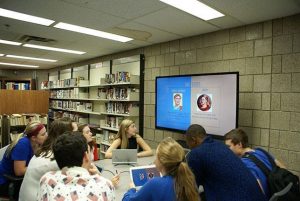
Collaboration stations in the library allow students to work in groups, projecting their shared projects on a single screen.
Thermal Imaging Camera, Chris Malio, STEM teacher
This camera will be used for the STEM Heat Loss Challenge – a hands on multidisciplinary activity that addresses standards in Earth Science, Physical Science, Engineering and Math. This project-based learning activity promotes an inquiry-based engineering design /construction challenge using SEEK Infrared technology to demonstrate how energy moves through residential homes. Students will watch how the energy flows and then works in teams to prevent the heat loss.
3D printers by Dave Kurtz, Science, Technology and Engineer High School Teacher
These printers will be used by students to learning programming, robotics and CAD. The students will use these printers while working on design concepts and development of their finished products.
Caching Device: Seth Goodman, MIS Department
This device is necessary to improve network response time and lessen Masco’s need to expand bandwidth which is needed to support the new STEM labs. The improved internet responsiveness will have an immediate impact on the productivity of our classroom technology activities.
SolidWorks CAD Software: Dave Kurtz, Science, Technology and Engineer High School Teacher
This software will be utilized by our high school students to work with 3D modeling and printing. In addition, the use of this cutting edge software it will expose the students to programming and design.
Arduino Laboratory Consumables: Dave Kurtz, Science, Technology and Engineer High School Teacher
The arduino lab will introduce our middle school and high school students to robotics programming and CAD. Students will create robotic designs utilizing CAD software and 3D printers.
Technology Upgrades: Seth Goodman, MIS Department
These technology upgrades include hard drives, memory cards and video cards for 60 PC’s along with an updated projector/chromecase package. These items are integral to the creation of the two STEM labs at Masco. These devices will be able to support 3D modeling, 3D printing, and other hands-on learning activities. They will help prepare students for Massachusetts curriculum frameworks and college/career readiness.
STEM Technology Chromebooks: Chris Malio, STEM teacher
These Chromebooks are for use in the 8th grade STEM class. The students will use them to explore online multimedia tools, tapping into rich databases to support curriculum. In addition, they will be able to look at 3D modeling which will enhance concepts and assist in differentiate instruction for students.
Chromebook Carts: Ben Hodges, Department Chair, Business and Computer Science Department
These two carts are used primarily for science classes in the Middle School. They enhance instruction and support curriculum that requires the increasing use of online tools.
Tower Garden: Keith Hartan, STEM Teacher
The Tower Garden® is an aeroponic system that uses a nutrient solution to grow fresh fruits, vegetables, and herbs. Because the system is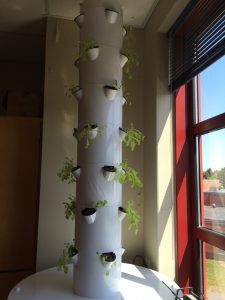 both compact and vertical, it can be used within a classroom setting. Mr. Hartan’s bioethics class is piloting the use of the Tower Garden to grow and harvest lettuce and basil. Vegetables and herbs produced over the course of the 4th quarter will be donated to a local food bank.
both compact and vertical, it can be used within a classroom setting. Mr. Hartan’s bioethics class is piloting the use of the Tower Garden to grow and harvest lettuce and basil. Vegetables and herbs produced over the course of the 4th quarter will be donated to a local food bank.
Student Day Of Poetry: Shannon Murphy, High School English Teacher
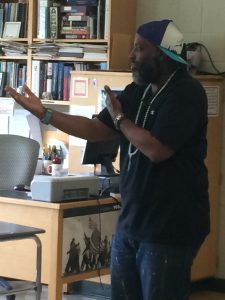 Masco’s 2nd annual Student Day of Poetry for sophomores and juniors is a program coordinated by the MA State Poetry Festival to inspire enthusiasm for poetry as a living art in our schools. A group of published poets, many of whom are also educators, led students in writing workshops and an open mic reading of student poetry. Students also performed their own work.
Masco’s 2nd annual Student Day of Poetry for sophomores and juniors is a program coordinated by the MA State Poetry Festival to inspire enthusiasm for poetry as a living art in our schools. A group of published poets, many of whom are also educators, led students in writing workshops and an open mic reading of student poetry. Students also performed their own work.
Apple TV: James Donahue, High School Foreign Teacher
The MEF grant that I received this year for a brand-new Apple TV has transformed my classroom. It now allows me to be anywhere in the  classroom, with my computer, projecting power points, videos, websites, interactive mimio activities… All with perfect clarity over Wi-Fi. It allows me to be a great teacher in the room– roaming around, talking to kids, making sure they are learning, as opposed to being tied down to a mouse on a computer that is physically attached to the projector in the front of the room. This MEF grant has pushed technology and learning to the next level in my classroom.
classroom, with my computer, projecting power points, videos, websites, interactive mimio activities… All with perfect clarity over Wi-Fi. It allows me to be a great teacher in the room– roaming around, talking to kids, making sure they are learning, as opposed to being tied down to a mouse on a computer that is physically attached to the projector in the front of the room. This MEF grant has pushed technology and learning to the next level in my classroom.
Vernier Lab Probes: Karen Blakeslee, STEM Department Head
Biology and chemistry students will use these much needed Vernier lab probes and interfaces. These devices allow students to measure and record digital data (temperature, pressure, pH, time, etc.) in real time and analyze results using graphical analysis software. In the past decade, Vernier has developed a more extensive array of probeware as well as hand-held devices, which allow students to record data in the field.
Arduinos Microprocessors: David Kurtz, Science, Technology and Engineer High School Teacher
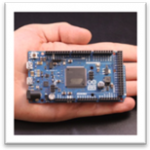 Arduinos microprocessors are an open-source electronics prototyping platform, which students use to program robots. Using free software to program with the Arduinos, greatly reduces the costs commonly associated with other robotics microcontroller systems. Arduinos are becoming the benchmark device for inexpensive robotics and microcontroller projects in college engineering courses. Students will use the Arduinos to build interactive circuits for robotics and learn programming. Potential projects include building timing mechanisms, robots, and GPS receivers.
Arduinos microprocessors are an open-source electronics prototyping platform, which students use to program robots. Using free software to program with the Arduinos, greatly reduces the costs commonly associated with other robotics microcontroller systems. Arduinos are becoming the benchmark device for inexpensive robotics and microcontroller projects in college engineering courses. Students will use the Arduinos to build interactive circuits for robotics and learn programming. Potential projects include building timing mechanisms, robots, and GPS receivers.
Brian Mintz and Norman Clark, Biopsychology High School Teachers
Biopsychology students will assist in the analysis of data consisting of electron micrographs of a mouse’s brain in an effort to prepare a 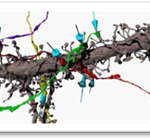 complete neural map. Masconomet students will collaborate with Harvard University on this project. Dr. Kasthuri, Conte Center at Harvard for Neuroscience, has lead inspiring workshops on brain research for our biopsychology students. Masco is the first school that Dr. Kasthuri is working with on this multi-year study.
complete neural map. Masconomet students will collaborate with Harvard University on this project. Dr. Kasthuri, Conte Center at Harvard for Neuroscience, has lead inspiring workshops on brain research for our biopsychology students. Masco is the first school that Dr. Kasthuri is working with on this multi-year study.
Classroom Audio System: Sandra Dearborn, Middle School Teacher
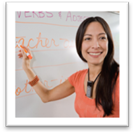 Classroom audio system provides amplification to the teacher’s voice. The speaker’s voice is projected from the back of the room and radiates forward enhancing student teacher communication. The teacher does not need to elevate their voice. The sound is evenly distributed throughout the entire room. Classroom audio ensures every word is understood minimizing the need for repetition or redirection.
Classroom audio system provides amplification to the teacher’s voice. The speaker’s voice is projected from the back of the room and radiates forward enhancing student teacher communication. The teacher does not need to elevate their voice. The sound is evenly distributed throughout the entire room. Classroom audio ensures every word is understood minimizing the need for repetition or redirection.
Classroom iPad: Kathleen Rourke Natale, High School Teacher
Classroom learning moves to the next level by using existing technology, Mimio screen, iPad and teaching apps such as Doceri. Doceri 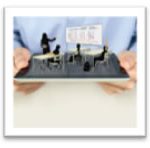 projects what is drawn on the iPad onto the Mimio screen. Students draw portions of a graph or proof and can pass it onto the next student for their contribution. Using Doceri and other apps into the classroom is an excellent way to keep students engaged and learning interactive.
projects what is drawn on the iPad onto the Mimio screen. Students draw portions of a graph or proof and can pass it onto the next student for their contribution. Using Doceri and other apps into the classroom is an excellent way to keep students engaged and learning interactive.
Poetry A Collection by Middle School Foreign Language Students: Kristen Eaton, Cheryl Kenney, Amy Mihailidis, Jeanne O’Hearn, Middle School Teachers.
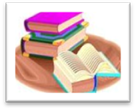 Students will create original poems in Spanish and French. Their inspiration will be authentic poets such as Apollinaire, Neruda and others. This project provides a connection to the literacy initiative and the foreign language frameworks. A book of poetry will be produced and students will share their achievement at a recital.
Students will create original poems in Spanish and French. Their inspiration will be authentic poets such as Apollinaire, Neruda and others. This project provides a connection to the literacy initiative and the foreign language frameworks. A book of poetry will be produced and students will share their achievement at a recital.
Building Biotechnology Skills in a High School Laboratory (Tube Roller/Food Kits):
Tammy Due, HS Science
Students will use the tube roller in a practical application of Synthetic Biolab where bacterial cells have been engineered. In the lab 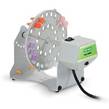 students will learn microbiology techniques, explore growth dynamics and molecular biology concepts along with error analysis and explore qualitative versus quantitative data collection and analysis. This equipment helps us build 21st century science lab and exposure to the biotechnology field.
students will learn microbiology techniques, explore growth dynamics and molecular biology concepts along with error analysis and explore qualitative versus quantitative data collection and analysis. This equipment helps us build 21st century science lab and exposure to the biotechnology field.
Community Poem Project
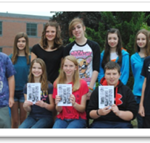 Jeanne O’Hearn, Middle School Spanish teacher.
Jeanne O’Hearn, Middle School Spanish teacher.
Publish a poetry book, ‘Celebration of Life in the Tri-Town composed of over 200 poems submitted by Masco students and a few faculty members. Foreign language students wrote their poems in Spanish, French, German, Chinese and Italian. The result is a special blend of many voices revealing thoughts and ideas about the special place where we live, learn and work.
Creating Videos for the Flipped Classroom:
Karen Blakeslee, Science, Technology & Engineering Department Head.
Supporting the Flipped Classroom concept, Bamboo tablets (along with Snag It software), will be used by teachers to create educational 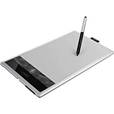 videos for students to watch as homework and discuss in class. Students can access instructional videos created with this technology and are invaluable resources for reviewing concepts that may not be fully mastered or for absent students. Tablet/videos will be shared with other teachers; already being used in some classrooms.
videos for students to watch as homework and discuss in class. Students can access instructional videos created with this technology and are invaluable resources for reviewing concepts that may not be fully mastered or for absent students. Tablet/videos will be shared with other teachers; already being used in some classrooms.
Tablet Online Exploration in the Classroom:
 Alyssa Schatzel, High School Science
Alyssa Schatzel, High School Science
Students develop their understanding of dynamic biological and physical processes through the use of color, WIFI tablets, to manipulate and enlarge structures. The tablets will be used in conjunction with online learning opportunities such as A.D.A.M., Explore-learning.com and online texts that accompany our textbooks.
Tablet Virtual Labs:
Karyn Coulon, High School Science Teacher
Tablets would be used for dissection alternatives in Anatomy and Physoilogy classes (Grades 11 &12) incorporating virtual dissection 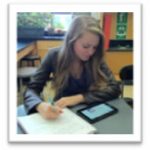 software from companies such as McGraw-Hill and A.D.A.M. Biology classes (Grades 9 & 10) will utilize Virtual lab sites, such as Explore Learning, to visually supplement classroom and text book theory.
software from companies such as McGraw-Hill and A.D.A.M. Biology classes (Grades 9 & 10) will utilize Virtual lab sites, such as Explore Learning, to visually supplement classroom and text book theory.
Web-based Student Response System:
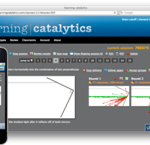 Christopher Love & David Kurtz, High School Science teachers.
Christopher Love & David Kurtz, High School Science teachers.
Using a web-based assessment tool expands our ability to measure students learning outcomes in the midst of the learning process so that instructional adjustments can be made to address conceptual misunderstandings. The current tool used in the classroom only allows students to answer multiple choice questions. The web-based response system would expand questions types to include drawing, algebraic and open-response questions.
Drawing Tools for Composing Digital Visual Narrative:
Maureen Bakis, High School English Teacher.
Using Three Wacom tablets (Bamboo create with Photoshop) English students will examine visual storytelling by composing graphic  (fiction & non-fiction) narratives. Many professional cartoonists employ this technology to compose their graphic novels.
(fiction & non-fiction) narratives. Many professional cartoonists employ this technology to compose their graphic novels.
Interactive White Board:
 What is an Interactive White Board? It is an interactive tool that brings learning to life in the classroom. Replacing the traditional white or black board, teachers can show students anything which can be presented on a computer’s desktop (educational software, websites, etc). Additionally, interactive whiteboards allow teachers to record their lessons and post the material for review by students – an effective instructional strategy for students who benefit from repetition, those who are absent from school, struggling learners or for exam review. Add a document camera and teachers can capture images of objects, documents, or students’ work to add the lesson. The assessment component provides instant feedback gauging student comprehension. Teaching staff can quickly adjust lessons to meet the needs of their students.
What is an Interactive White Board? It is an interactive tool that brings learning to life in the classroom. Replacing the traditional white or black board, teachers can show students anything which can be presented on a computer’s desktop (educational software, websites, etc). Additionally, interactive whiteboards allow teachers to record their lessons and post the material for review by students – an effective instructional strategy for students who benefit from repetition, those who are absent from school, struggling learners or for exam review. Add a document camera and teachers can capture images of objects, documents, or students’ work to add the lesson. The assessment component provides instant feedback gauging student comprehension. Teaching staff can quickly adjust lessons to meet the needs of their students.
